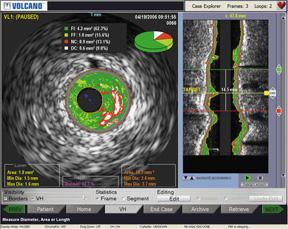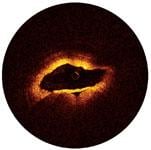
For years researchers have experimented with stem cells in attempts to regrow myocardium in patients who suffer permanent tissue damage from myocardial infarction. A handful of companies are pushing forward with clinical trials of their technologies in an effort to show this futuristic concept has promise.

Over the last decade, cardiac stem cell therapy has shown tantalizing but as yet unrealized potential as a treatment for the left-ventricular dysfunction (LVD) that develops subsequent to myocardial infarction (MI). Experimentally, somatic stem cells of various lineages, as well as pluripotent stem cells, have been induced to transform into contractile myocytes expressing cardiac-specific proteins.
Only a few years ago, separate software systems without a common interface were the industry standard to manage electrocardiograms (ECGs), hemodynamic monitoring systems in the cath lab, picture archiving and communications systems (PACS), electrophysiology, cardiac ultrasound and other areas of cardiac specialty.
Cardiac PET/CT represents a major advancement in cardiovascular diagnostics, offering significant clinical and ...

For decades, cath lab clinicians essentially had only one option for achieving hemostasis management following a procedure – compression. That changed in the 1990s with the introduction of vascular closure devices and hemostatic pads, which were designed to significantly shorten the time it took to close the wound left at the access site.

According to the American College of Cardiology (ACC), each year nearly 400,000 patients are admitted to U.S. hospitals with ST segment elevation myocardial infarction (STEMI). National ACC/American Heart Association (AHA) guidelines state that hospitals treating STEMI patients with emergency percutaneous coronary interventions (PCI) should reliably achieve a door-to-balloon time (D2B) of 90 minutes or less, and studies have demonstrated strong associations between time to primary PCI and in-hospital mortality risk.
May 19, 2011—Arterial Remodeling Technologies (ART) announced details of the state-of-the-art design of its polymer-based bioresorbable stent platform at EuroPCR 2011.
SPONSORED CONTENT — Studycast is a comprehensive imaging workflow system that allows healthcare professionals to work ...
May 19, 2011 – New clinical data presented today at EuroPCR 2011 demonstrate immediate and long-term health-related quality-of-life (HRQoL) benefits for patients receiving the Medtronic CoreValve System from Medtronic Inc. The favorable two-year results from the French CoreValve multicenter prospective study are the largest set of CoreValve HRQoL data and the longest-term HRQoL data available from all transcatheter aortic valve implantation (TAVI) systems.
May 19, 2011 - Neovasc Inc., a developer of novel technologies used to treat vascular disease, reported positive six-month follow-up data for a patient with severe refractory angina who received the Neovasc Reducer product in a “live case” procedure broadcast during the 22nd annual Transcatheter Cardiovascular Therapeutics (TCT) scientific symposium in September 2010. The data, which showed a marked improvement in the patient’s angina symptoms, was presented today at EuroPCR, a leading European cardiovascular conference.
May 19, 2011 - Results from a study validating Cheetah Medical's noninvasive NICOM system specifically for use in patients with pulmonary hypertension were presented Wednesday, May 18th, at the 2011 American Thoracic Society Annual Meeting in Denver.
Providing exceptional cardiovascular care for patients to achieve the best possible outcomes is the number one goal for ...
May 19, 2011 - BridgePoint Medical Inc. has announced that they have received clearance of an expanded indication for the CrossBoss Catheter and Stingray System from the U.S. Food and Drug Administration (FDA). The expanded indication includes the intraluminal placement of conventional guidewires beyond stenotic coronary lesions [including chronic total occlusions (CTOs)] prior to PTCA or stent intervention. CTOs are chronically stenosed lesions that completely block a coronary artery – typically for 3 months or longer - and prevent blood circulation to critical areas of the heart.

When a lab is transitioning from transfemoral to transradial cardiac catheterizations, the process can be either encouraging or discouraging to all staff involved. To ease the transition, it might be useful to employ previously implemented ideas, techniques and equipment selections that have had positive outcomes. This article will discuss patient preparation, equipment selection and address common inventory concerns that occur when developing a transradial catheterization program. The ideas and initiatives discussed in this article are those that we undertook at the Jesse Brown VA Medical Center in Chicago and may not reflect other cath labs’ setup. However, most of the concepts are applicable to all catheterization labs.

There are many advantages to using optical coherence tomography (OCT) intravascular imaging. However, interventionalists should not rush to trade in their intravascular ultrasound (IVUS) systems, said Michael R. Jones, M.D., FACC, director of the Central Baptist Hospital Heart and Vascular Institute, Lexington, Ky.
Cardiac positron emission tomography (PET) is growing in popularity among cardiologists because it provides the ability ...

Imaging technology and diagnostic tools for interventional cardiologists have changed dramatically over the past few years with the introduction of optical coherence tomography (OCT), improvements in intravascular ultrasound (IVUS) and pressure guide wires used in fractional flow reserve (FFR). Product innovation and integration of these technologies, as well as a growing base of clinical evidence, are transforming the way physicians diagnose, treat and follow-up patients undergoing percutaneous coronary intervention (PCI).

The biggest trend in cardiovascular ultrasound is the adoption of 3-D/4-D echo systems for better images, more data, better measurement quantification and faster workflow. Other key trends include software to speed workflow with fewer keystrokes and to enhance quantification, miniaturization, increased use of tissue strain imaging and expanded use for operating room and cath lab procedures.
There were 15 abstracts presented describing radial access and intervention during the American College of Cardiology (ACC) and i2 Summit meeting in April in New Orleans. The abstracts focused on some of the most burning issues in current radial research.

 May 19, 2011
May 19, 2011







